Feeling heavy and tired after a workout is tough. It’s like your body is sore for days. I’ve been there, especially after long runs or strength training. So, I’ve looked into what really helps bodies recover faster.
This isn’t just about taking supplements. It’s about giving your muscles what they need to heal and get stronger.
This guide shows you the best supplements for recovery. You’ll learn how protein, BCAAs, and omega-3s help. They reduce inflammation, fix muscles, and give you more energy.
Whether you’re into running, lifting, or just starting to get fit, these tips help. They let you train harder without feeling exhausted.
Key Takeaways
- Learn science-backed supplements to improve post-workout recovery.
- Understand how key nutrients like protein and omega-3s aid muscle repair and energy.
- Discover options tailored to your fitness goals, from reducing soreness to boosting endurance.
- Get practical advice to choose supplements that align with your routine.
- Explore evidence-based solutions for faster recovery without guesswork.
Understanding Post-Workout Recovery
Recovery is more than just a pause between workouts. It’s the key to making progress. Supplements and strategies help rebuild muscles, restore energy, and lessen soreness. Without it, gains in strength and endurance disappear.
The Importance of Recovery
- Muscle repair: Microtears in muscles heal during rest, leading to growth.
- Energy replenishment
: Glycogen stores refuel, powering future sessions.
- Inflammation control
: Proper recovery reduces pain and accelerates healing.
Common Post-Workout Challenges
Many athletes face:
- Delayed muscle soreness (DOMS) that limits mobility
- Dehydration from intense exercise
- Nutrient gaps that slow progress
“Ignoring recovery risks burnout and injury, undermining long-term fitness goals.” – National Strength and Conditioning Association
Using targeted supplements and smart routines can turn setbacks into steps towards peak performance.
Protein Supplements for Muscle Repair
🌿 The Superfood Your Body Needs!
Protein is key for fixing muscles after exercise. The right muscle recovery supplements give your body the amino acids it needs. Here are three proteins that help with recovery:
Whey Protein Isolate
This fast-acting protein sends amino acids to muscles fast. Its benefits are:
- Rapid absorption within 30 minutes post-workout
- Complete amino acid profile supports muscle synthesis
- Low in fat and carbs for clean recovery
Casein Protein
Casein’s slow digestion feeds muscles all night. Use it:
- To sustain amino acid levels for 6-8 hours
- Before bed to prevent muscle breakdown
- For gradual energy release during fasting periods
Plant-Based Options
Pea, rice, and soy proteins are good for vegans. Look for blends like pea+rice to get:
- Complete amino acid coverage
- 1.6–2.2g protein/kg of body weight daily
- Easy digestion for sensitive stomachs
Combine these proteins with water and rest for best results. Dosage varies by workout intensity—start with 20–40g per serving.
BCAAs: The Branched-Chain Amino Acids
BCAAs are key when picking the best recovery supplements. They include leucine, isoleucine, and valine, which are crucial for muscle repair. Leucine, especially, boosts protein making and slows muscle loss. This helps athletes recover quicker after hard workouts.
BCAAs can reduce exercise-induced muscle damage by up to 22%, according to a 2023 study in the Journal of Nutrition.
Benefits of BCAAs for Recovery
- Boosts protein synthesis to rebuild muscle fibers
- Reduces post-workout soreness by lowering inflammation
- Maintains energy levels during prolonged exercise
Recommended Dosages
Go for 5-10 grams of BCAAs each day, spread out in servings. It’s important to time them right: 3-5 grams during or right after exercise. Mixing BCAAs with carbs helps them absorb faster. Always check labels or talk to a nutritionist for your specific needs.
Creatine: Boosting Recovery and Performance
Creatine is a top choice for post-workout recovery. It fuels muscles and helps repair them. Let’s explore how it boosts energy and shortens recovery time, and debunk common myths.
🔥 Energy, Health & Vitality with Moringa Magic!
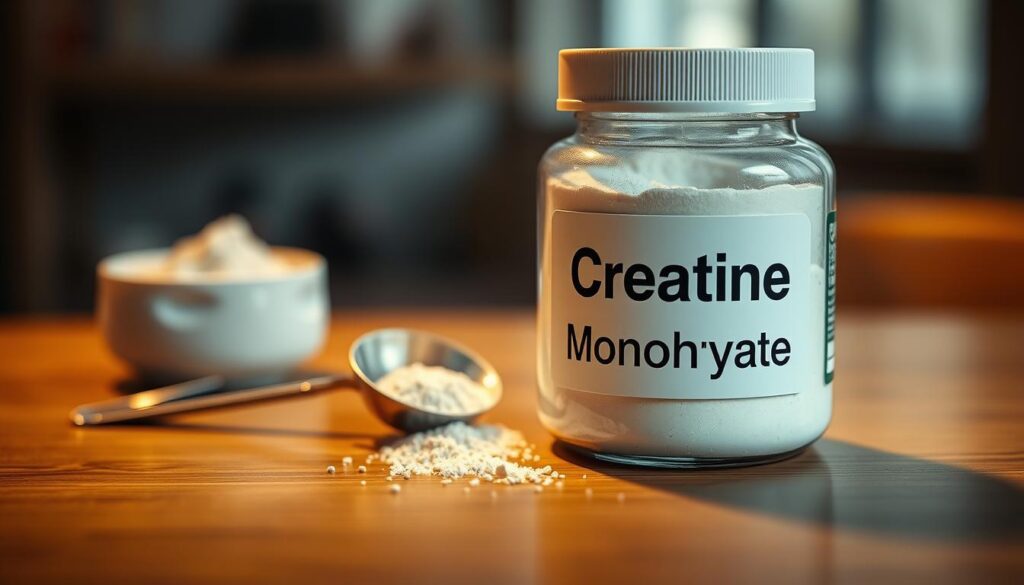
How Creatine Works
Creatine increases ATP production, the energy muscles need during exercise. It quickly refills ATP stores, reducing fatigue and muscle damage. Studies also show it lowers inflammation, making it crucial for recovery.
Despite myths about kidney strain, research proves it’s safe when used right.
Best Forms of Creatine
Here’s a look at the most popular forms:
- Creatine Monohydrate: The most studied and affordable option. Ideal for long-term use.
- Creatine HCL: Has better solubility, so you need smaller doses for the same benefits.
- Creatine Ethyl Ester: Aimed at faster absorption, but evidence is mixed.
- Buffered Creatine: Claims to ease stomach issues, but lacks long-term studies.
I recommend starting with creatine monohydrate. Use a loading phase (20g daily for 5-7 days) or a maintenance dose (3-5g daily). Always drink plenty of water and talk to a professional before starting.
Omega-3 Fatty Acids: Reducing Inflammation
Intense workouts cause inflammation as the body repairs itself. Omega-3 fatty acids in natural post-workout supplements help balance this. They ease muscle soreness and speed up recovery. These fats are natural anti-inflammatories, essential for any recovery plan.
Sources of Omega-3s
| Source | Type of Omega-3 | Key Benefits |
|---|---|---|
| Fatty Fish (Salmon, Mackerel) | EPA/DHA | Direct anti-inflammatory effects |
| Flaxseeds, Walnuts | ALA (converts to EPA/DHA) | Plant-based option |
| Algae Oil | EPA/DHA | Sustainable vegetarian source |
Benefits for Recovery
- Reduces exercise-induced inflammation
- Shortens muscle soreness duration
- Supports joint and tendon health
Research indicates 2-3 grams daily of EPA/DHA is beneficial for recovery. Choose high-purity fish oil or algae-based supplements for better absorption. Combining these with a balanced diet will yield the best results.
Glutamine: Supporting Immune Function
Glutamine is the most common amino acid in our bodies. It’s crucial for recovery after working out. When we exercise hard, our glutamine levels drop. This can slow down recovery and weaken our immune system.
Glutamine helps with muscle repair and overall health. It’s a key part of recovery supplements.
How Glutamine Aids Recovery
Glutamine meets four important recovery needs:
- Boosts protein synthesis to repair muscle tissue
- Reduces muscle protein breakdown post-exercise
- Enhances glycogen storage for energy restoration
- Maintains gut health to prevent immune stress
Dosage Recommendations
The right amount of glutamine depends on how hard you train and your goals. Research has found:
| Training Intensity | Daily Dosage (grams) | Timing Tips |
|---|---|---|
| Light/Moderate | 5–10g | Split into 2 doses daily |
| High-Intensity | 10–15g | Post-workout + bedtime |
| Extreme Training | 15–20g | Add morning dose for athletes |
Research shows athletes using glutamine supplements get sick less often after training. Start with small amounts to avoid stomach issues.
Electrolyte Supplements: Replenishing Lost Minerals
Electrolyte supplements are a key part of the top recovery supplements for active individuals. These minerals like sodium, potassium, and magnesium help muscles and nerves function after exercise. Without them, your body can’t recover properly.
Importance of Hydration
Hydration isn’t just about drinking water. Sweating during workouts flushes out electrolytes, causing cramps or weakness. Replacing them boosts energy and speeds recovery. For intense workouts over an hour, electrolytes are critical.
Recommended Electrolyte Blends
- Sports drinks: Include sodium and potassium (e.g., Nuun tablets).
- Powder mixes: Add to water for customizable strength (e.g., Ultima Replenisher).
- Magnesium-focused options: Magnesium glycinate or chelated forms absorb best for muscle relaxation.
Magnesium alone aids muscle recovery. Look for blends combining it with sodium and potassium. Adjust intake based on sweat rate and workout duration. Overhydration without electrolytes can dilute minerals further, slowing recovery.
Adaptogens: Managing Stress and Recovery
Modern training pushes the body hard, causing stress that slows down workout recovery aid. Adaptogens, natural plant extracts, help the body handle stress better. They control cortisol, the stress hormone that can lead to muscle breakdown and fatigue.
✅ Discover the Benefits of Moringa!

Popular Adaptogens for Athletes
Key adaptogens for athletes include:
- Ashwagandha: Reduces cortisol and supports muscle recovery
- Rhodiola Rosea: Boosts endurance and mental focus
- Cordyceps: Enhances oxygen utilization and stamina
- Holy Basil: Mitigates oxidative stress post-exercise
Benefits and Usage
Studies show ashwagandha can reduce how hard workouts feel by 15%. A 2022 study in the Journal of the International Society of Sports Nutrition found cordyceps increased VO₂ max by 8% in endurance athletes. Dosages vary: rhodiola (200-600 mg/day) is best in the morning or midday, while ashwagandha (300-500 mg) is good at night.
Athletes using adaptogen stacks reported 23% faster recovery times post-marathon, per a 2023 peer-reviewed study.
Using adaptogens with electrolyte blends or BCAAs can have better effects. Make sure to choose third-party tested brands for purity. Consistency is key: take adaptogens for 4-6 weeks to see the best results as a workout recovery aid.
Herbal Supplements for Recovery
Herbal ingredients are great for helping your body recover after working out. Turmeric and ginger are especially good because they fight inflammation. They are key parts of post-workout recovery supplements.
Turmeric and Curcumin
Curcumin is the active part of turmeric. It helps reduce inflammation caused by exercise. But, it’s not easily absorbed by the body.
To get the most out of it, take it with black pepper or in liposomal form. Studies suggest taking 1-3 grams a day can help with muscle soreness. This is without the risks of NSAIDs.
Ginger: A Natural Anti-Inflammatory
Gingerols in ginger help reduce inflammation and muscle soreness. Research shows 2 grams of powdered ginger daily can lessen pain after hard workouts. It’s better than NSAIDs because it doesn’t upset your stomach.
“Natural anti-inflammatory supplements like turmeric and ginger avoid the long-term risks of NSAIDs while supporting tissue repair.”
When choosing supplements, look for ones with high concentrations of active ingredients. For turmeric, aim for 95% curcuminoids. Ginger supplements with 5% gingerol are most effective. Taking them with meals can help your body absorb them better.
Timing Your Supplements for Maximum Effect
Getting the most out of muscle recovery supplements depends on when you take them. The timing is as crucial as the supplements themselves. Studies show that taking them at the right time can enhance performance and reduce recovery time.
🌟 The Natural Secret to a Healthier Life!
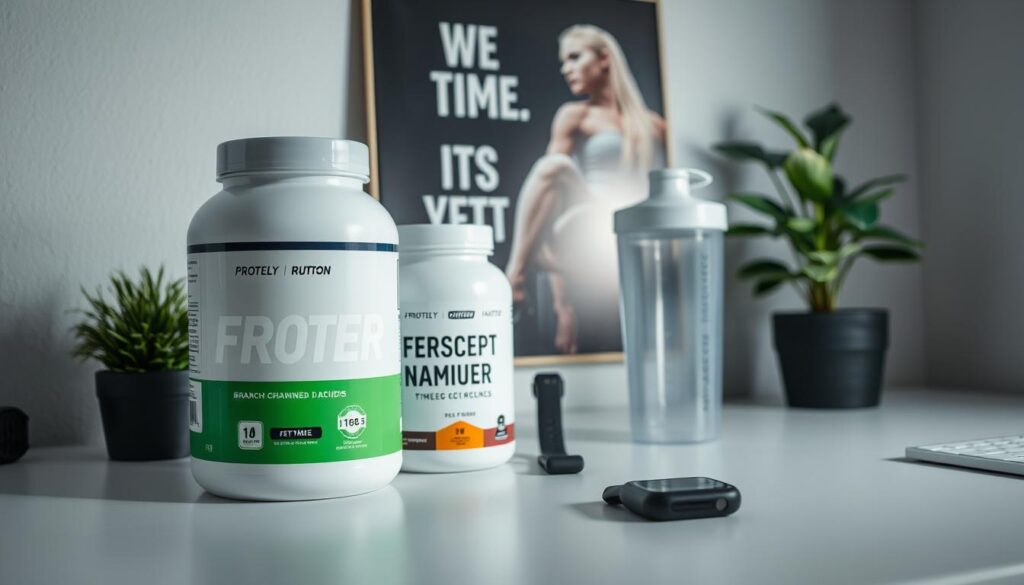
“The anabolic window isn’t a rigid 30-minute rule—it’s about consistent nutrient intake,” states a 2023 study in the Journal of Sports Nutrition.
Pre-Workout vs. Post-Workout Timing
Timing falls into two main categories: pre-workout and post-workout. For instance:
- BCAAs (branched-chain amino acids) are best before or during exercise to fuel muscles
- Whey protein is ideal within 30 minutes post-workout to kickstart repair
- Creatine can be taken any time but pairs well with training days
Decoding the Anabolic Window
Once, it was thought you had just 30 minutes after working out to maximize gains. But now, research suggests this window is more flexible. What’s key is consistent daily intake, not strict timing.
For muscle gain, focus on protein after your workout. For endurance, electrolytes during and after are crucial. Supplements like casein before bed help with repair while you sleep. Adjust your timing to fit your schedule for the best results.
Final Thoughts on Post-Workout Recovery Supplements
Choosing the right recovery supplements starts with knowing what you need. Every athlete is unique, so your supplements should match your goals and lifestyle. Protein and creatine are good bases, but how they work for you can vary. Here’s how to pick wisely.
Tailoring Your Supplement Stack
Begin with the basics. Use whey protein or plant-based options to repair muscles. Then, add BCAAs or omega-3s if you fight inflammation. Don’t mix things that do the same job, like pairing electrolytes with salty foods. Watch how your body reacts to each supplement to make your stack better over time.
Consulting with a Healthcare Professional
Always talk to a doctor or dietitian before starting supplements. They can check for any risks with your health or meds. For example, creatine might affect how much water you need. Getting advice from a pro helps keep you safe, especially with things like adaptogens or herbal extracts. Always tell them about any meds you’re taking.
Remember, supplements help but don’t replace rest, good food, and training. Focus on getting enough sleep, eating well, and improving slowly. With smart choices and expert advice, you can create a recovery plan that really helps you reach your fitness goals.
FAQ
What are the best supplements for recovery after a workout?
How do protein supplements help with muscle recovery?
Are natural post-workout supplements effective?
How do BCAAs benefit recovery?
What role do electrolytes play in post-workout recovery?
How can I use adaptogens to support my recovery?
What is the anabolic window and how does it relate to recovery supplements?
How much glutamine should I take for recovery?
Did you like this article? See also: https://powerfitguide.com/how-to-choose-the-best-supplement-for-weight-loss/

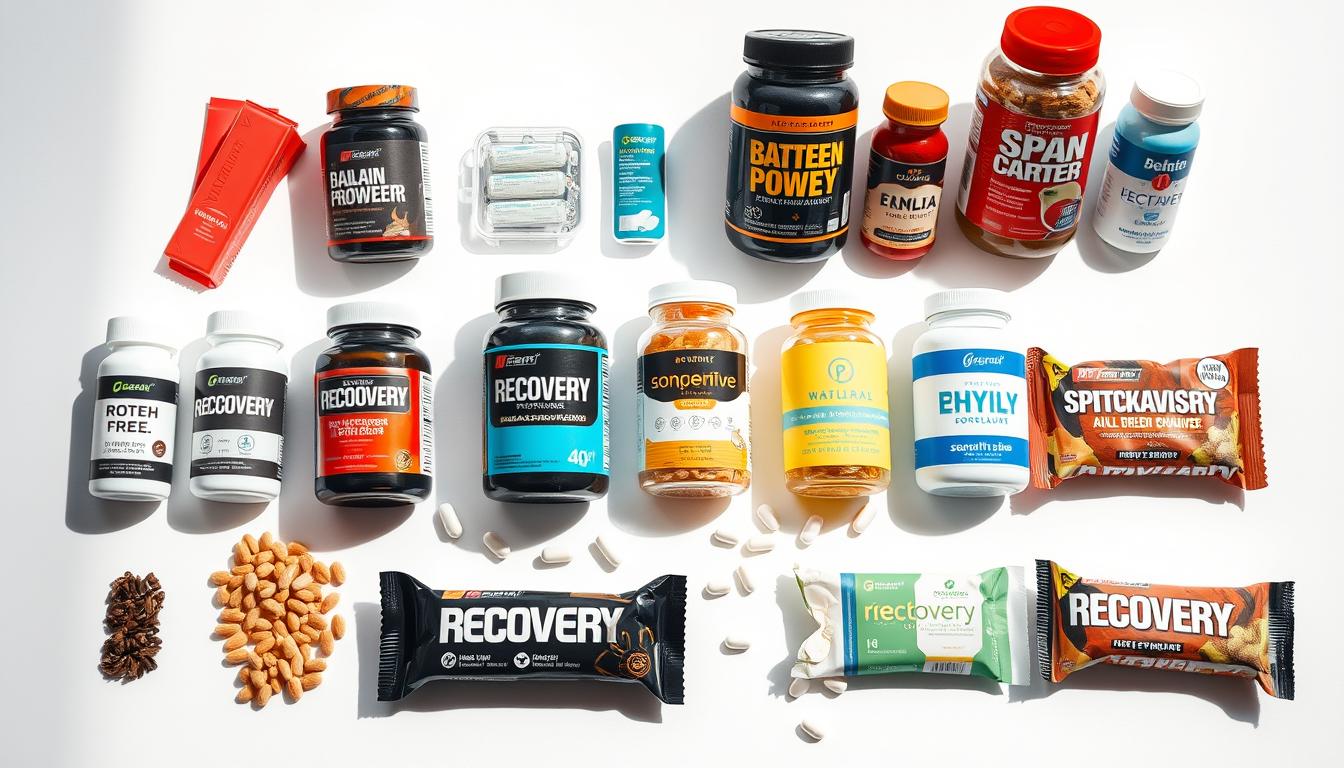
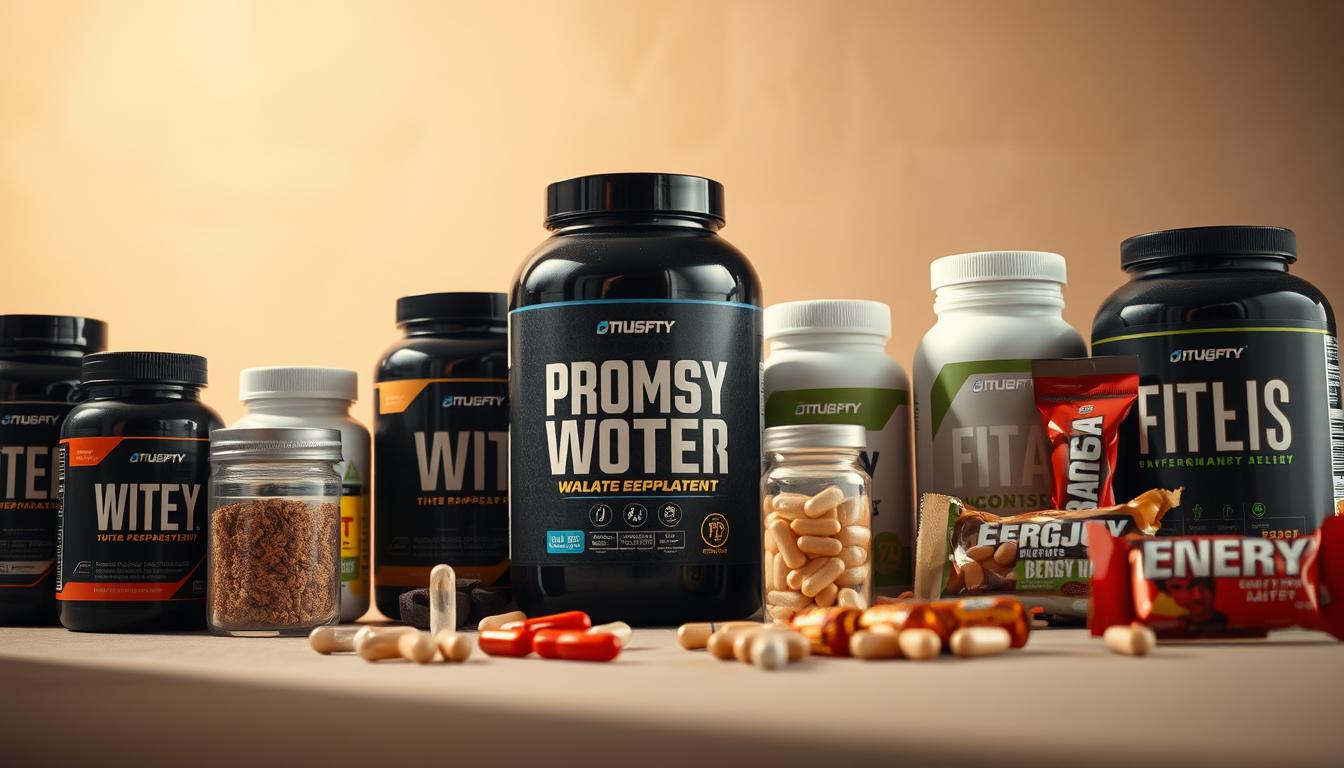
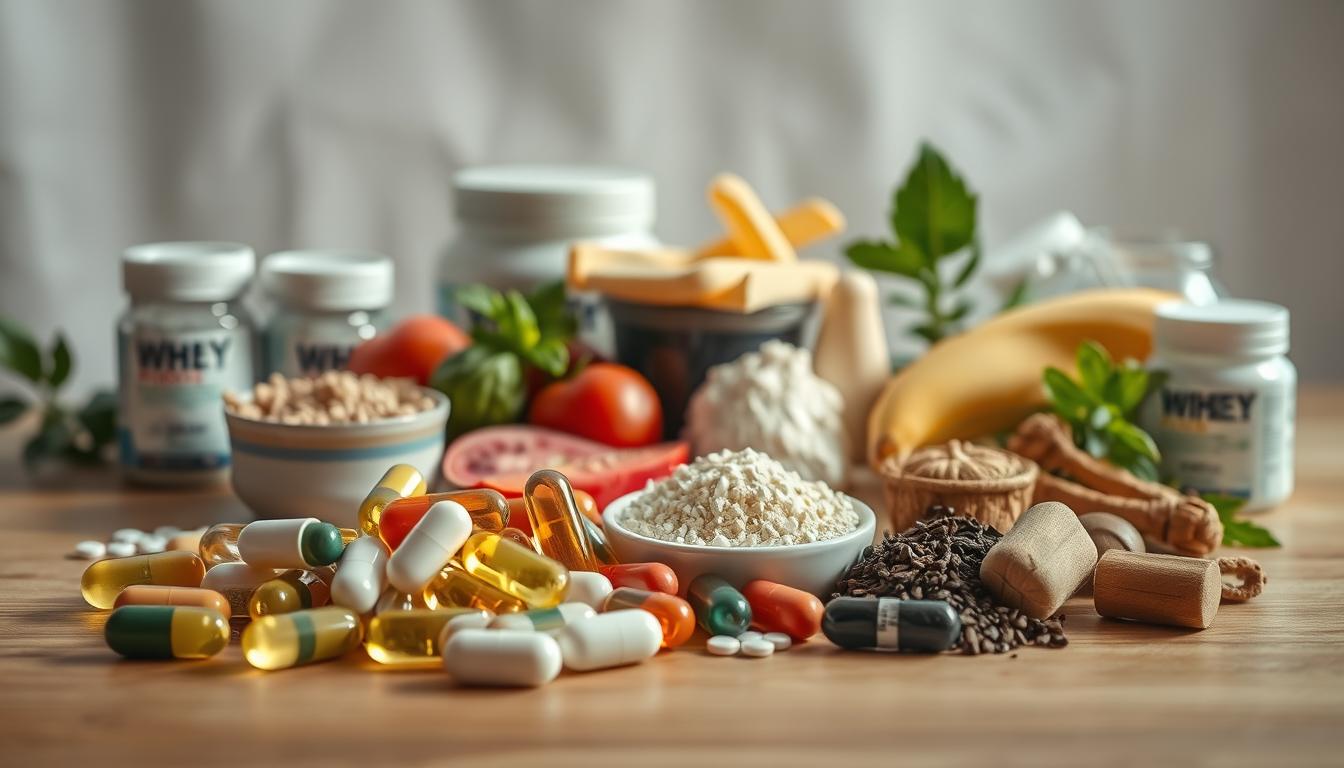
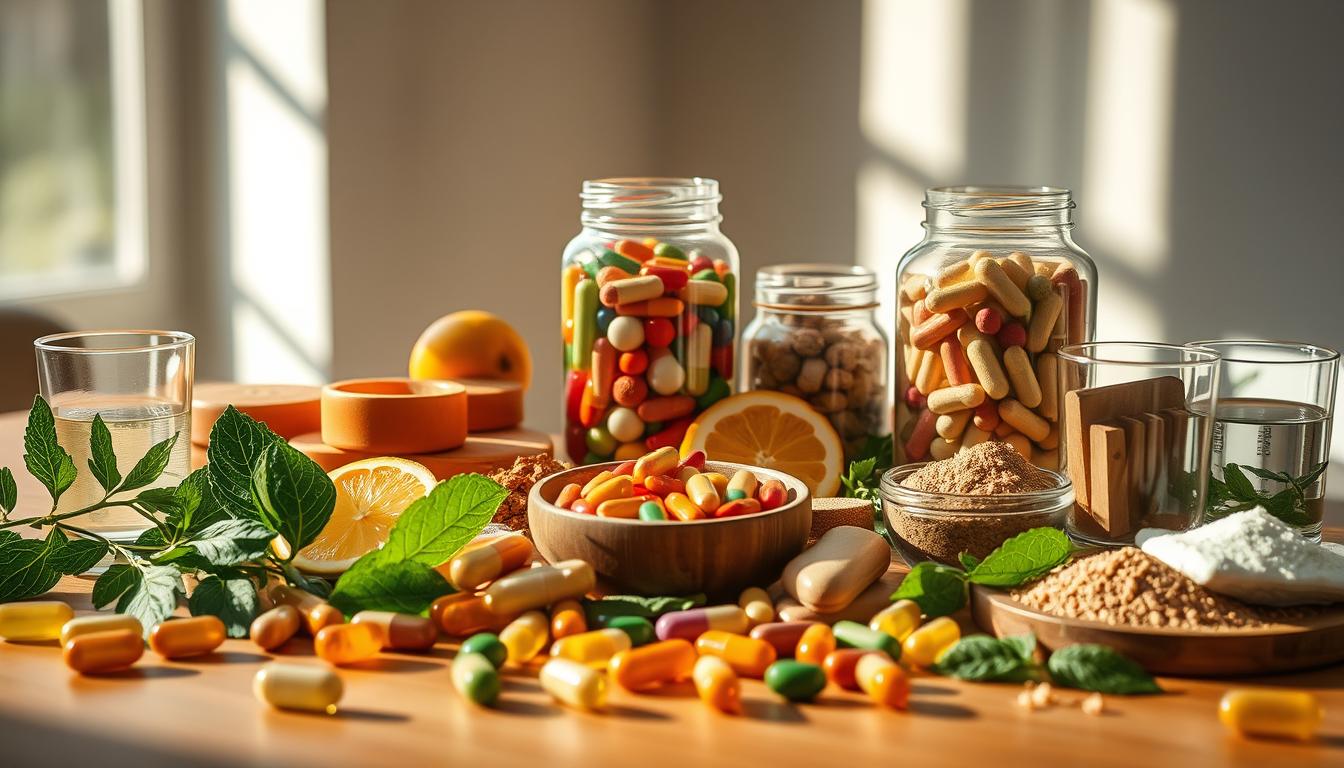


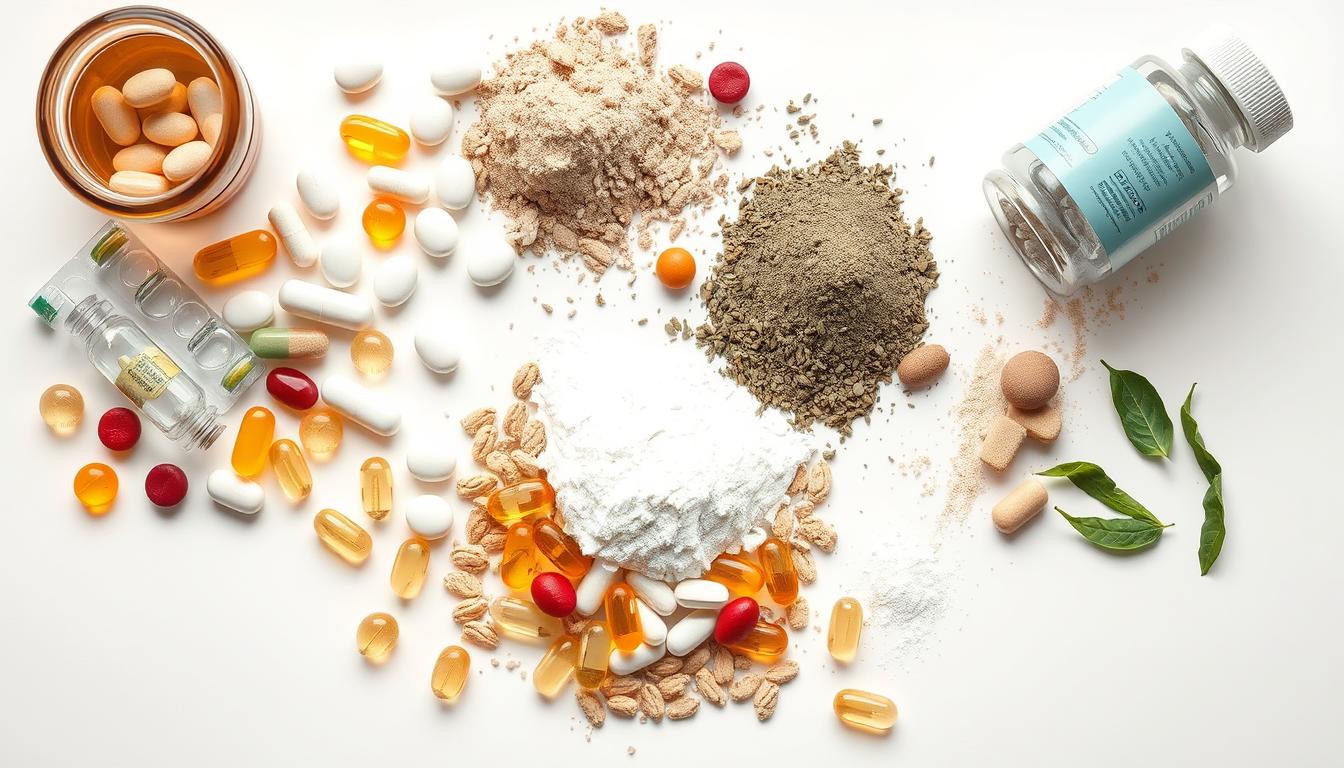
Comment on “Supplements to Improve Post-Workout Recovery”